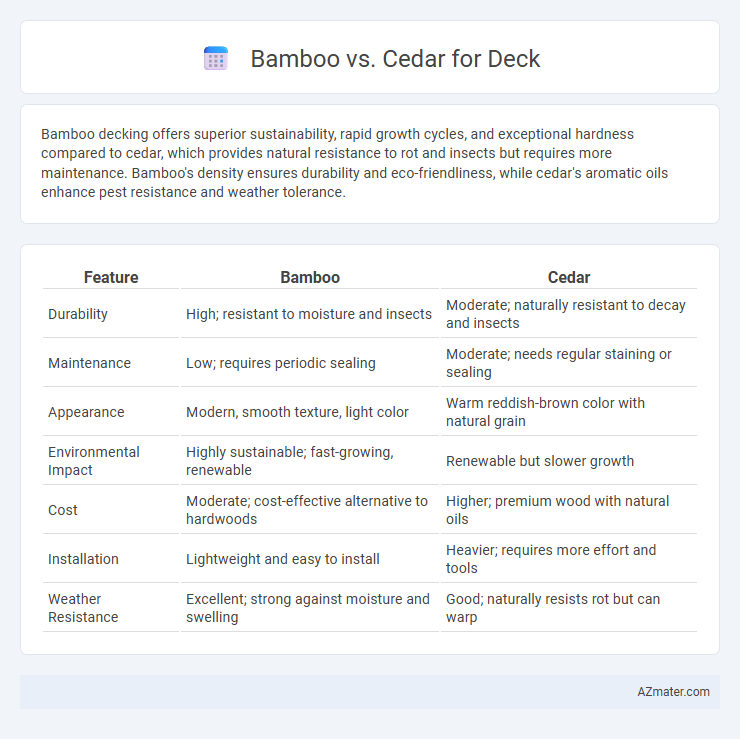Bamboo decking offers superior sustainability, rapid growth cycles, and exceptional hardness compared to cedar, which provides natural resistance to rot and insects but requires more maintenance. Bamboo's density ensures durability and eco-friendliness, while cedar's aromatic oils enhance pest resistance and weather tolerance.
Table of Comparison
| Feature | Bamboo | Cedar |
|---|---|---|
| Durability | High; resistant to moisture and insects | Moderate; naturally resistant to decay and insects |
| Maintenance | Low; requires periodic sealing | Moderate; needs regular staining or sealing |
| Appearance | Modern, smooth texture, light color | Warm reddish-brown color with natural grain |
| Environmental Impact | Highly sustainable; fast-growing, renewable | Renewable but slower growth |
| Cost | Moderate; cost-effective alternative to hardwoods | Higher; premium wood with natural oils |
| Installation | Lightweight and easy to install | Heavier; requires more effort and tools |
| Weather Resistance | Excellent; strong against moisture and swelling | Good; naturally resists rot but can warp |
Introduction: Bamboo vs Cedar for Decking
Bamboo and cedar are popular decking materials known for their durability and natural appeal. Bamboo offers rapid renewability and exceptional hardness, making it a sustainable and resilient choice. Cedar provides inherent resistance to decay and insects, with a richly aromatic wood that ages gracefully under outdoor conditions.
Material Overview: Bamboo and Cedar Decking
Bamboo decking offers exceptional hardness and rapid sustainability, making it a highly durable and eco-friendly choice compared to traditional woods. Cedar decking is naturally resistant to rot and insects, providing a lightweight yet strong material with a warm, rich color and smooth texture. Both materials deliver excellent performance outdoors, but bamboo's fast growth and dense fiber structure result in greater hardness, while cedar's aromatic oils enhance its longevity and weather resistance.
Durability and Longevity Comparison
Bamboo decking offers impressive durability due to its dense, fibrous structure and natural resistance to moisture and pests, often outperforming softwoods in longevity. Cedar, while naturally resistant to decay and insects, tends to require more frequent maintenance and sealing to preserve its lifespan in harsh outdoor conditions. Properly treated and maintained bamboo decks can last 25-30 years, whereas cedar decks typically range between 10-20 years depending on climate and care.
Weather Resistance and Maintenance Needs
Bamboo decks offer excellent weather resistance due to their natural silica content, which makes them highly resistant to moisture, insects, and decay compared to cedar. Cedar, while naturally resistant to rot and insect damage, requires regular maintenance such as sealing and staining to maintain its weatherproof qualities and prevent splitting or warping. Bamboo's dense fiber structure results in lower maintenance needs, making it a durable and cost-effective choice for outdoor decking in diverse climates.
Environmental Impact and Sustainability
Bamboo decks offer a highly sustainable choice due to their rapid growth rate, with some species reaching maturity in just 3-5 years, making them a renewable resource that reduces deforestation. Cedar wood, while naturally resistant to decay and insects, grows slower and requires more land and time to harvest, leading to higher environmental impact in terms of resource depletion and carbon footprint. Choosing bamboo for decking significantly lowers greenhouse gas emissions and supports eco-friendly construction practices through its efficient carbon sequestration and minimal chemical treatments.
Aesthetic Appeal and Design Options
Bamboo decking offers a sleek, modern aesthetic with a consistent grain and warm golden hue that enhances contemporary outdoor spaces. Cedar provides a rich, natural look with varying shades of reddish-brown and a distinctive aromatic scent that complements rustic or traditional designs. Both materials offer versatile design options, but bamboo's uniform texture suits minimalist styles, whereas cedar's natural knots and color variations bring character to classic and eclectic decks.
Cost Comparison: Bamboo vs Cedar Decks
Bamboo decks generally cost between $8 and $15 per square foot, offering a more affordable option compared to cedar decks, which typically range from $15 to $30 per square foot. Bamboo's rapid growth and renewable nature contribute to its lower price, while cedar's durability and resistance to decay increase its initial investment. Maintenance expenses for cedar can be higher over time due to sealing and staining requirements, whereas bamboo decks often need less frequent upkeep, resulting in better long-term cost efficiency.
Installation Process and Complexity
Bamboo decking typically involves a straightforward installation process, often utilizing tongue-and-groove planks that fit tightly together, reducing gaps and enhancing structural integrity; its lightweight nature simplifies handling and cutting. Cedar decking requires more precise calibration for spacing due to natural wood expansion and contraction, and must be fastened with corrosion-resistant screws or nails to prevent shifting and warping over time. Both materials demand a level of skill to ensure proper alignment and secure fastening, but bamboo's engineered uniformity generally results in quicker and less complex installation compared to cedar's variable grain and moisture content considerations.
Performance in Different Climates
Bamboo decks exhibit excellent durability and moisture resistance, making them ideal for humid or tropical climates where rot and mold are common concerns. Cedar offers natural oils that provide moderate resistance to decay and insect damage, performing well in cooler, drier environments but needing more maintenance in wet conditions. Both materials require proper sealing to enhance longevity, but bamboo generally outperforms cedar in terms of stability and resilience across diverse climate zones.
Final Verdict: Choosing Between Bamboo and Cedar for Your Deck
Bamboo offers exceptional durability and eco-friendliness, making it a sustainable choice for decking with high resistance to moisture and insects. Cedar provides natural beauty and resistance to decay, featuring inherent oils that protect against rot and insect damage while requiring less maintenance than many other woods. For a long-lasting, environmentally conscious deck, bamboo stands out, but if classic aesthetics and moderate upkeep are priorities, cedar remains a reliable and attractive option.

Infographic: Bamboo vs Cedar for Deck
 azmater.com
azmater.com